Being a transgender person in an African society has its (un)fair share of challenges. These are often a result of society’s cultural values which tend to suppress the visibility of the trans community.
Thriving in a society that is yet to accept your existence can be quite daunting. Still, a Zimbabwe-based trans woman, Alessandra “Bree” Chacha continues to defy odds and disrupt the status quo.
Bree, whose first act of defiance was transitioning in a country that’s yet to warm up to the existence of the LGBTQI community, is the proud founder of a company that also manufactures and distributes skincare products.
Queerstion Media co-editor, Tanaka Musa sat down with Alessandra
Chacha to get to know more about her and work.
TM: Tell us, who is Alessandra Chacha? Where did you grow up? If you’re willing to, please share with us some of your childhood memories.
AC: I’m a trans woman who’s popularly known as Bree. I’m based in Harare, Zimbabwe. I’m a human rights activist and my main focus is advocating for the rights of the trans community in Zimbabwe. Also, I’m a philanthropist and businesswoman; I’m the founder and CEO of Balt Global Ltd, a company focused on skincare, lifestyle, and consultancy.
My father died before I was even a year old. So I grew up with my mother — a strong-willed, caring and independent woman — who worked hard to ensure that my brother and I never lacked anything. My mother’s personality and work ethic taught me to believe in myself and go after my dreams.
I inherited some of her bodily features and would often get ridiculed because of it. Thankfully, my mother defended me each time I got stigmatised for “being too much of a girl.” Sadly, she passed on when I was nine. I feel like I am her legacy and I still have fond memories of her. Every day, I continue to practice her teachings on love, diligence, and humility.
After my mother’s death, I was taken in by my uncle and aunt, two caring guardians who were there for me despite the stigma and backlash they faced for taking care of a trans person. It’s been quite a journey, growing up as a transgender person. Still, I’m glad I managed to follow my dreams and become the kind of woman my guardians could be proud of.
TM: Who are your role models?
AC: I have always looked up to my late mother as my first role model. She was a dynamite of a lady I’m so proud of. I also look up to Folorunsho Alakija, a multi-billionaire Christian woman from Nigeria. These two ladies embody class, resilience, a heart for the community, and a drive to be their best for the betterment of the world. All these are my values as well.
TM: How has it been like transitioning in Zimbabwe?
AC: Transitioning gave me the opportunity to be the real me — the best me. This allowed that woman everyone noticed in me when I was growing up to become this lady of purpose and value to others.
Nowadays, people can rarely tell that I’m still transitioning as I pass as a cis woman. Still, transitioning has been quite a journey too and I’m grateful for support from family, friends, colleagues, and some community members.
TM: How did you start Balt Global Ltd.? What inspired you, and how has it been being a trans woman running a business in Zimbabwe?
AC: I’ve always wanted to own a skincare, lifestyle and digital consultancy company. I had a passion for it. I also possessed the skills to run a business which I acquired while growing up. My name, Alessandra, means “a noble queen with a heart for the world.” So by nature, it was fitting that I run my own kingdom — Balt Global Ltd.
I have to admit, I did experience some “push factors” which led me to venture into the world of business. Being openly transgender, I faced a lot of discrimination in the corporate world. Often, I’d be rejected at job interviews for being different even if I had the right qualifications.
Thankfully, my former employer gave me the chance to excel and grow professionally. However, the current legal framework in
Zimbabwe, which does not recognize trans people, made it hard for me to fit in during my transition. I also feared the community’s reaction which, in some cases, would be justified given the Zimbabwean context.
The challenges I faced in the corporate world forced me to quit my job. I decided to become my own boss and eventually, I founded Balt Global Ltd.
TM: You did it and you’re still doing it — transitioning and running a business. Does this mean it’s possible for every other transgender person living in Zimbabwe?
AC: Being the CEO — a Black trans woman CEO — has been amazing. I feel great. My ideas are taken seriously. My team and I dream together; we also work together until our goals are achieved. My employees respect me. They look up to me — something I never expected seeing as how I grew up being discriminated against for who I am.
Our suppliers, customers, and other stakeholders respect what I bring to the table. They appreciate our high-quality solutions. They look at me as just another intelligent and professional businesswoman who gets the job done, is focused on their needs, and works well with her team to deliver satisfactory results.
I do believe that any trans person — in fact, any marginalized, “thought-of-as-nothing” person — can achieve their dreams and prove the world
wrong. In my case, I also knew I had to put my trust in God and remind myself that who I am isn’t a mistake. I was just a woman-in-progress created in his image and created for a higher purpose. I always believed that I could make it because God was on my side. Also, I’m someone who doesn’t take no for an answer and when I think it, I don’t stop until I achieved it.
TM: As a trans advocate, what’s the current status of the trans movement in
Zimbabwe? Where do you see it in the next five years?
AC: Five years from now, I see the trans movement in Zimbabwe reaching greater heights. Initially, we were not only seen as taboos in society but also as being only good for sex work which seemed to be the only source of income for many of us. As the years have progressed, many of us have
risen up to show that we too are important and are capable of playing important roles in society as entrepreneurs, medical specialists, lawyers, supermodels, engineers, you name it.
We seek to remind society that trans people are human beings who, like any other human being, deserve the same opportunities to utilize their full potential for the betterment of our communities.
Zimbabwe has already started to experience a shift in mindset, thanks to the Global Fund, Ministry of Health, UNDP, NAC, Transsmart, the Purple Royale podcast, TIRZ, TREAT, GALZ, Community Radio Harare, Capitalk FM, and other stakeholders that continue to shed light on the trans community and our daily struggle for acceptance in Zimbabwe. These struggles revolve around our right to access education, employment, and our general right to freely exist.
TM: What would you tell your younger self?
AC: Honestly, I don’t regret any choices I’ve made or experiences I’ve gone through since childhood. The positive ones encouraged me to do better and were proof that there’s hope. The negative ones strengthened me and enabled me to keep moving. I guess I’d tell my younger self to stay strong because there’s always light at the end of the tunnel.
TM: Any advice to transgender folks who are going to read this?
AC: My only advice is to never stop dreaming even when life gets hard; when you feel like giving up; when you feel like you’re not enough. Never stop dreaming about the perfect scenario in your life. Dreams are a figment of a future that’s yet to pass. If you can dream, you can achieve.
Bree Chacha on Being Trans and Running a Business in Zimbabwe

